#armistace100
Photo
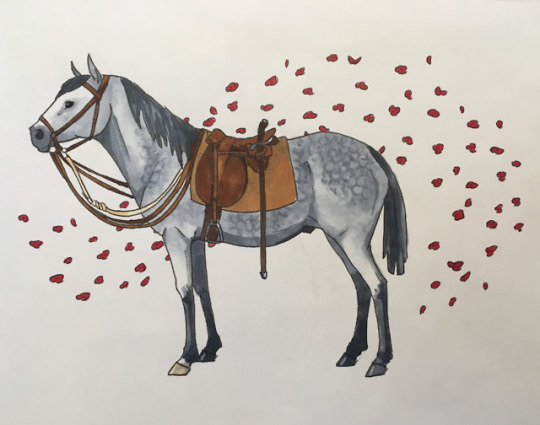
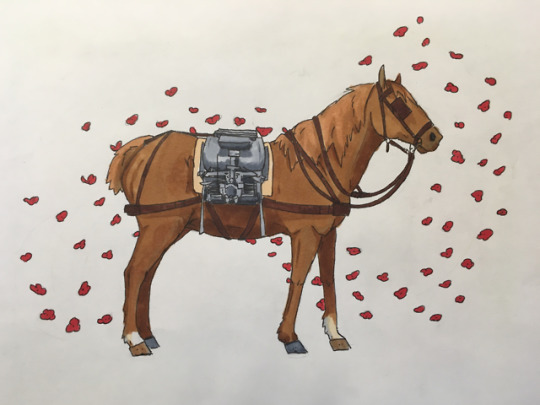
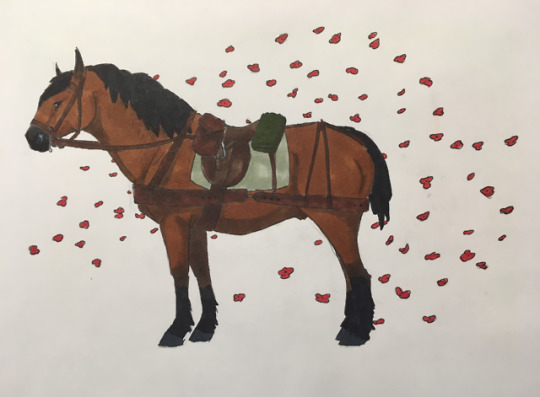
A little late for the Armistice, but here’s one for the horses.
From top: english cavalry horse, french cavalry horse with field radio, german artillery horse.
32 notes
·
View notes
Text
The Art of War and the Killing Joke - The Comedy Company

(The PPCLI Comedy Company circa 1917-1919 - photo, public domain)
From 1914-1918, more than 600,000 Canadians packed up their troubles and merrily marched, flags waving, into the trenches and foxholes of Flanders and France. By the time the Armistice was signed at 11:00 am on November 11, 1918, more than 59,000 were dead, over 172,000 wounded. Globally, more than 10 million soldiers died, resulting in a “lost generation.” White crosses row on row, cenotaphs, literature, and visual art are some of The Great War’s tangible legacies. The lingering wounds of bereaved families and communities as well as the true extent of the conflict’s effects on the nation’s psyche are sepia-toned intangibles.
The development of Canadian sketch comedy is one of the Great War’s unexpected legacies. When playwright and history buff Neil Grahn was sorting through the archives of a Canadian regiment – Princess Patricia’s Canadian Light Infantry (PPCLI) – for another project, he discovered the fascinating story of the PPCLI Comedy Company. The tiny band of soldiers entertained their comrades; they fought, Ross rifles in hand, in some of the war’s bloodiest theatres.
Their story is the subject of Grahn’s script, The Comedy Company Or: What’s So Funny about Death, Mud, and Machine Guns? A Fictional Recounting of an Absolutely True Story. It traces the company’s journey through the Ypres Salient, juxtaposing their original comedy sketches and songs with the grinding realities of war – its sounds, smells, textures, and shell shock.

(Battle scene, The Comedy Company - photo Marc J. Chalifoux)
“Our involvement in World War One was immersive,” says Grahn “It nearly drowned us.”
The real Comedy Company was the brainchild of Major, later Lieutenant Colonel, Agar Adamson. His rationale was simple and a bit chilling. Lift the troops’ morale through humour, let them escape the horrors, inspire them to fight through the meat grinder of trench warfare.
LILLEY: Okay, I’m looking at it like this. If we can come up with a show that makes the rest of our boys forget, even for minute, what a stinking, butcher’s shop we’re all stuck in - then maybe we’ll be doing some good.
FENWICK: Yeah, I guess if we can get the boys to relax and have a laugh, they might be a little sharper next time they’re in the front trenches.
CUNNINGHAM: Exactly. It’s a simple formula. We boost morale - make troops more happy. Troops feel better - they kill more Germans.
MCLAREN: Yes! And when we kill enough Fritzies, they give up, the war ends, and we get to go home! Our little show’s ultimate mission is to help our boys with their killing. We’re going to create comedy for killing!
CUNNINGHAM: You know what McLaren? That’s the first thing you’ve said today I’ve liked. ‘Comedy for killing’ – Let’s hear it on three boys! One, two three…
ALL: Comedy for killing!
(The Comedy Company, Act I, Scene 7)

(Sheldon Elter and Andrew MacDonald Smith - photo Marc J. Chalifoux)
“This company was absolutely used as a tool by high command,” says Grahn, “but its execution brought the men together. Yes, it was designed for esprit de corps, but it was good on a human scale because it allowed an escape for the men. What fascinated me, what forms the heart of the show is the story of humans finding morale and sanity in a situation that dwarfs anything anyone’s experienced in terms of horror and discomfort. That attitude of ‘I hate the bastards that started this thing. I joke so that I may live’.”
Moreover, the troupe laid the foundation of a uniquely Canadian brand of sketch comedy.
“These guys were the granddaddies of sketch as we know it in Canada,” Grahn says. “I’m part of that legacy through things like The Irrelevant Show and Three Dead Trolls in a Baggie. They looked at life around them and made fun of that; the rifles, webbing, bully beef, and mud in boots. It was authentic, Canadian, not the usual British thing of singing Gilbert and Sullivan. The form came back to Canada – which at the time was trapped in the pincers of America and Britain. It is part of our national character. Wow.”
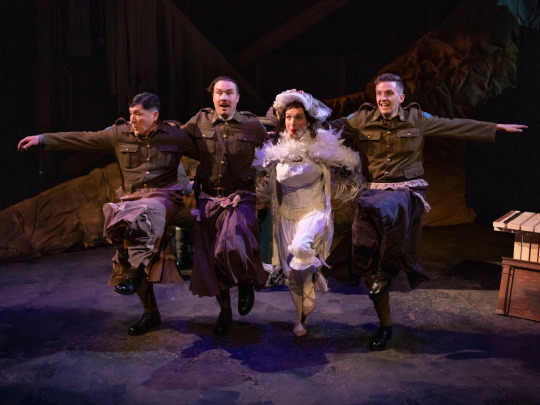
(Sheldon Elter, Jesse Gervais, Steven Greenfield, and Andrew MacDonald Smith dance a cancan in The Comedy Company - photo Marc J. Chalifoux)
The play joins a canon of scripts by Alberta playwrights that take on different aspects of the Canadian experience of WW1 – Vern Thiessen’s Vimy and Stephen Massicotte’s Mary’s Wedding. Although The Comedy Company examines a different aspect of the conflict, it too is an act of remembrance.
“One hundred years isn’t really such a long time ago,” says Shadow Theatre artistic director John Hudson, who also directs the show. “My Great Uncle was one of the many underage soldiers who enlisted under a false name. He never came home. I choke up when I think of him and how it destroyed the family. They were wrecked, and my story is just one of millions. Go to Newfoundland and on July 1, they remember the Newfoundland Regiment, which was slaughtered on July 1, 1916 at Beau Hamel.”
Both Hudson and Grahn agree that the men of The Comedy Company were “comedian warriors” who helped their comrades through the worst, and probably allowed many to survive in the face of despair.
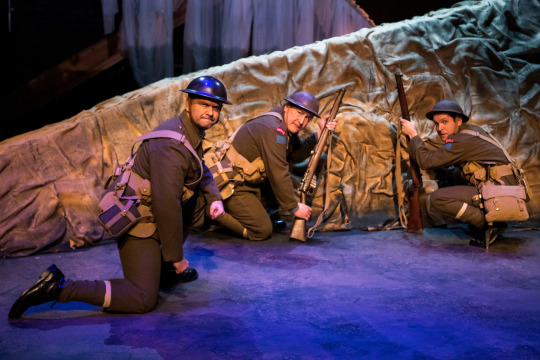
(Nathan Cuckow, Sheldon Elter, and Steven Greenfield hunker down in a trench - image Marc J. Chalifoux)
Several of the men were wounded, and the first commanding officer, Lieutenant Cunningham, was so badly injured in the attack on Vimy Ridge he never returned to active duty. Lieutenant Colonel Adamson was seriously wounded at Passchendaele – but The Comedy Company marched on into memory and applause. The conclusion of their story is beautifully summed up by Edmonton’s Colin Maclean in his Gig City review:
“Later, the comedy troupe joined with another collection of players to form the famous “Dumbells.” They performed before the King and even had a run on Broadway.
But, mostly, they continued to entertain the troops.
More full disclosure: I grew up with stories about the “Dumbells” because one evening, in the audience, among hundreds of his fellows, was my own father. He never forgot that night.”
Shadow Theatre’s production of The Comedy Company runs at the Varscona Theatre until November 11. Tickets are available here.
There are many events in Edmonton commemorating Remembrance Day and the 100th anniversary of the Armistice. Here are a few
Armistice100 will take place at the Alberta Legislature on Sunday, November 11 beginning with a 21 Gun Salute at 11am
Project Heroes continues at the Prince of Wales Armouries Heritage Centre. This exhibit uses stories, individual portraits and larger paintings to honour the lives of Canadian soldiers who died in Afghanistan.
The Loyal Edmonton Regiment Museum will hold a Remembrance Day ceremony at the Prince of Wales Armouries Heritage Centre at 11am on Sunday, November 11.
Redpatch continues its run at the Citadel Theatre until November 11
WWI stats - https://www.warmuseum.ca/firstworldwar/history/after-the-war/legacy/the-cost-of-canadas-war/)
#shadowtheatre#yegarts#RemembranceDay#armistace100#princesspatriciascanadianlightinfantry#ppcli#neilgrahn#yegtheatre#edmonton#varsconatheatre
1 note
·
View note
Text
Razor, nationalism and WWI
It might just be my particular bubble which gives me this impression, but at least on the internet the political right appears to be on the rise. Not just in the sheer number of people aligning themselves with these ideas, but also in peoples heads, where right wing ideas seem to become more and more centra lto people’s worldviews. I came across one rather shocking example today. Razorfist uploaded one of his articulate rants about current affairs. This time the target was those who see te rise of nationalism as one of the primary causes of the first world war.
Now, Razorfist has proven before that he is willing to bend the truth to suit his narrative. One example that sticks out in my mind is when he accused Al Gore of predicting the world would end in 2010, even though in the very same video he showed an article with mister Gore’s actual prediction: in the movie An Inconvenient Truth he stated that the warming process would reach a point of no return in 2010, which was consistent with the scientific consensus at that time. The fact that this prediction turned out to be off doesn’t change the fact that in this particular case Razor does not have the science on his side, yet he displays the kind of confidence in his statements that would make you suspect he does.
So this video kind of made me laugh. Not the claim itself; certainly the root causes of the first world war are still widely debated so an opinion off the beaten path is sometimes valuable. But the statements he makes in combination with his claim to be a WWI buff, that’s just too much. First, he claims that WWI was the cause of nationalist tendencies, and that they did not exist before that. This displays such an appalling lack of historical insight, I barely know where to start. You see, the idea of the nation is a modern idea if there ever was one. Sure, there’s always been things like tribal loyalty and cultural identity to a degree, but the nation is something different from that. Mainly, the idea of the nation as a sovereign body really had its proper start with the French revolution, before which it only floated around in intellectual circles. The idea was that now there was no king and no religion to unite the masses under a single banner, it needed a new, more abstract concept to rally around. Of course monarchies and religion still existed, but compare that to the middle ages where the idea of the nation didn’t really exist. People belonged to a certain religion, and they were subject to a divinely appointed lord, but they were not part of, say, the German nation.
With the invention of nation states came the modern national army, which relied on conscripts of the civilian population unlike the small, professional armies of the past. The boost that this gave to the military capability of the state made sure that nationalism was adapted quickly by most societies. The idea of the German nation and the Italian nation were born around this time, which both would bear their fruits several decades later. So to say nationalism had nothing to do with causing the first world war is blatantly false: without it there wouldn’t even have been a Germany. Of course one could also point out that the soldiers who volunteered didn’t march into battle for god and king; these were not the crusades in that respect. In the case of France there wasn’t even a king to do any such thing for. They went to war for king and country, for the fatherland, for France and so on. I guess one could respond to this by pointing out that the war had already started by then, which is true, but it amazes me that anyone can think these nationalist sentiments just came out of nowhere right after war was declared.
So what role did nationalism play in the outbreak of WWI? Razor puts te blame squarely on that era’s version of globalisation: the military alliances that characterises the international political landscape at that point. But if that’s true, it is a far cry from what we would recognise as globalisation today. In fact, there was only a globalised society in the economic sense. Yes, there was economic interdependence, which produced the wealthiest society the world had seen up until that point. But in a political sense the nation states all very much acted in their own interest. That’s what the alliances were for, alliances that were far from set in stone by the way, and changed quite frequently. The fact that the both sides ended up with the players they did was by no means a forgone conclusion. I say this to help illustrate that the national governments of that time thought very much in terms of their own national interest, rather than being motivated by some big globalist idea.
Razor takes some potshots at the EU for being a globalist organisation, praising countries like Italy, Hungary and Poland for standing up against them. Can I just say how sickening I find it that people who claim to love democracy and individual freedom choose the side of the Polish and Hungarian governments in their conflicts with the EU? I don’t know where this meme started exactly, but Victor Orban and Jaroslaw Kaczynski are not the good guys in this story from a pro-democracy perspective! Both gentleman have severely harmed the separation of powers in their countries, especially the independence of the courts, and have almost eliminated dissenting voices in the media. They seem to be trying hard to turn their countries into totalitarian states following the Russian model, and the EU is trying to stop them.
Italy is a different story, I admit, but even there it’s hard to sympathise. It was Italy’s (and Greece’s) insistence on a European solution for the migrant problem that started the whole drama. On top of that there were the Berlusconi governments that made an absolute mess of the state finances, which the current government refuses to deal with. All of Italy’s problems are of its own making, and now they try to drag the rest of Europe down with them.
But back on track: saying that the EU bears any resemblance to the alliance system of yor is preposterous. There simply was no overarching political system of any importance in place at that time. Sure, one can argue that war was increasingly becoming an international thing, but it was still driven purely and simply by national interests alone. Even the war between Austria-Hungary and Serbia is a lot more clear cut when you remember that, unlike what Razor insinuates, the latter was never occupied by the former. Serbia, based on nationalist ideology, insisted they had a right to Bosnia, which had been annexed by Austria-Hungary in 1908. The assassin who shot the arch-duke Franz Ferdinand was a fanatic nationalist, and the reason that scared the Vienna government was because there were so much more of him.
If you still doubt nationalism was at the root of this whole affair: consider Russia. Russia had no obligation to come to the aid of Serbia, but they considered the country to be in their sphere of influence, and thus protecting it to be a matter of national interest. Things like that are pretty much unthinkable in the Europe of today. The EU has made it that every country has a say in the increasingly more tight nit continent, and no one country can dominate another without getting into trouble with the rest of them, since they all need each other. That is the modern EU, which has stood together for almost seven decades now, and I’ll be damned if that is taken away from us by the short sighted, historically illiterate.
0 notes
Text
Badlands75RT @Marmel: Trump gets a “Who’s a good boy” pat from his master. #VeteransDay #Armistace100 https://t.co/nsYZGBtsjq
Trump gets a “Who’s a good boy” pat from his master.#VeteransDay#Armistace100
pic.twitter.com/nsYZGBtsjq
— Steve Marmel (@Marmel) November 11, 2018
from Twitter https://twitter.com/Badlands75
November 11, 2018 at 01:20PM
via IFTTT
0 notes
Photo

They will not grow old, as we who are left grow old. Age shall not weary them nor the years condemn. At the going down of the sun and in the morning, We will remember them. #Armistace100 #November11 #RemembranceDay #WW1 #War #WorldWarOne #FirstWorldWar #Poppies #Poppy #Remembrance #IWM #ImperialWarMuseum https://www.instagram.com/p/BqCRWqwHPKS/?utm_source=ig_tumblr_share&igshid=16m4v2zkj36j5
#armistace100#november11#remembranceday#ww1#war#worldwarone#firstworldwar#poppies#poppy#remembrance#iwm#imperialwarmuseum
0 notes
Photo

#RememberenceSunday #Armistace100 (at St Edburg's Church, Bicester) https://www.instagram.com/p/BqDq-s7HDDtrnTcdJEsDEvPXRyRW7V48mYphhY0/?utm_source=ig_tumblr_share&igshid=u89lc67kh84f
0 notes